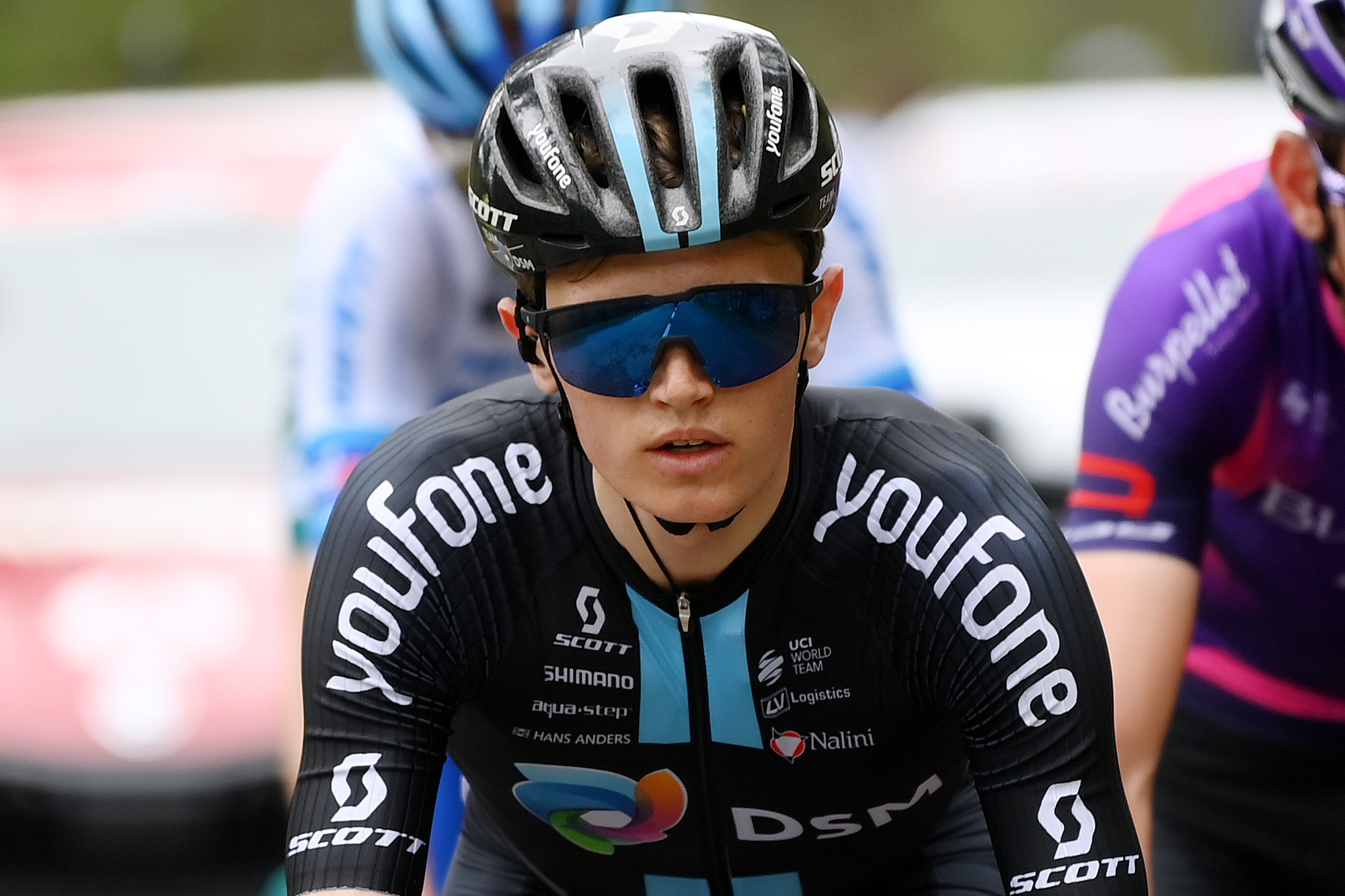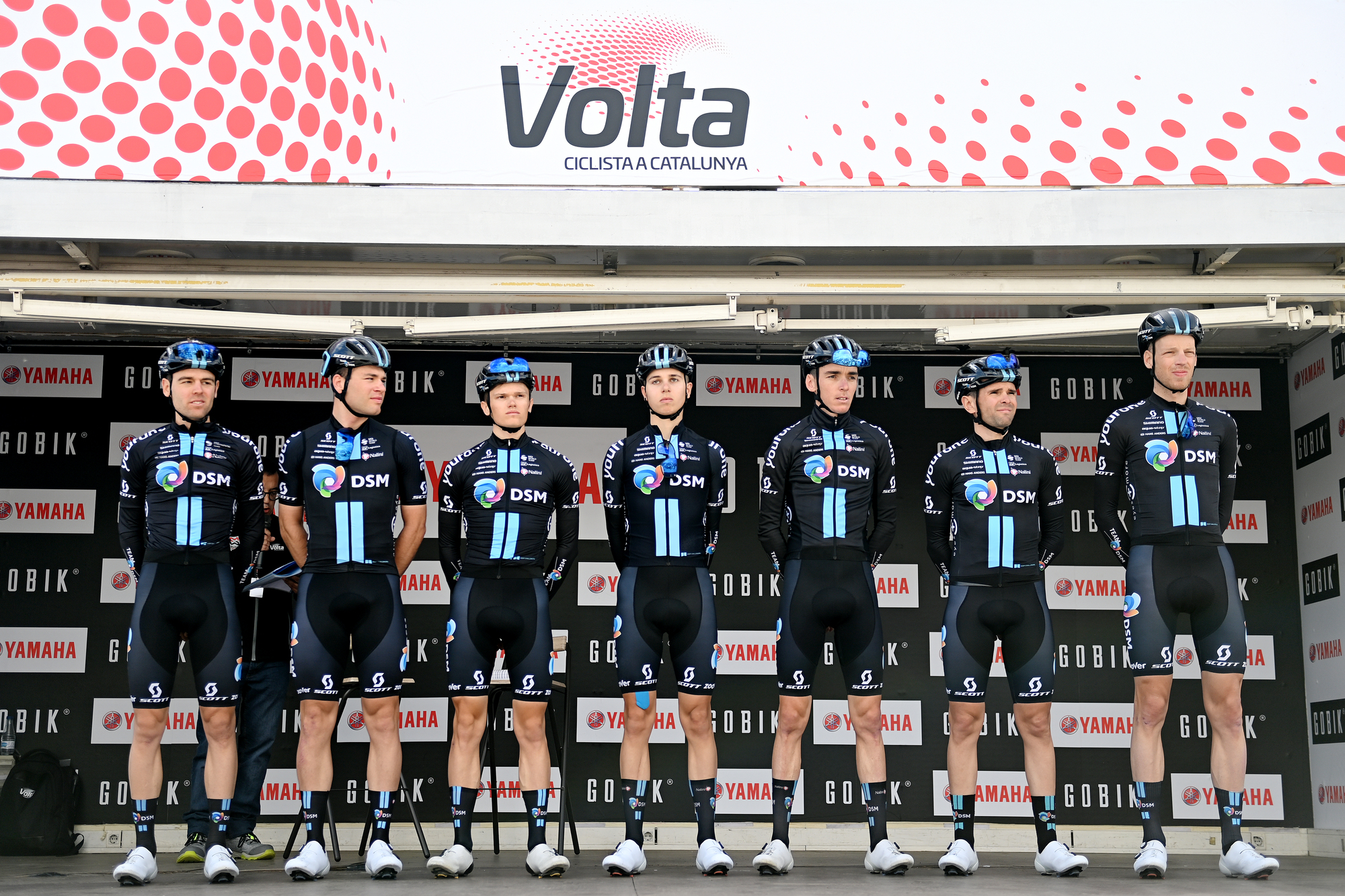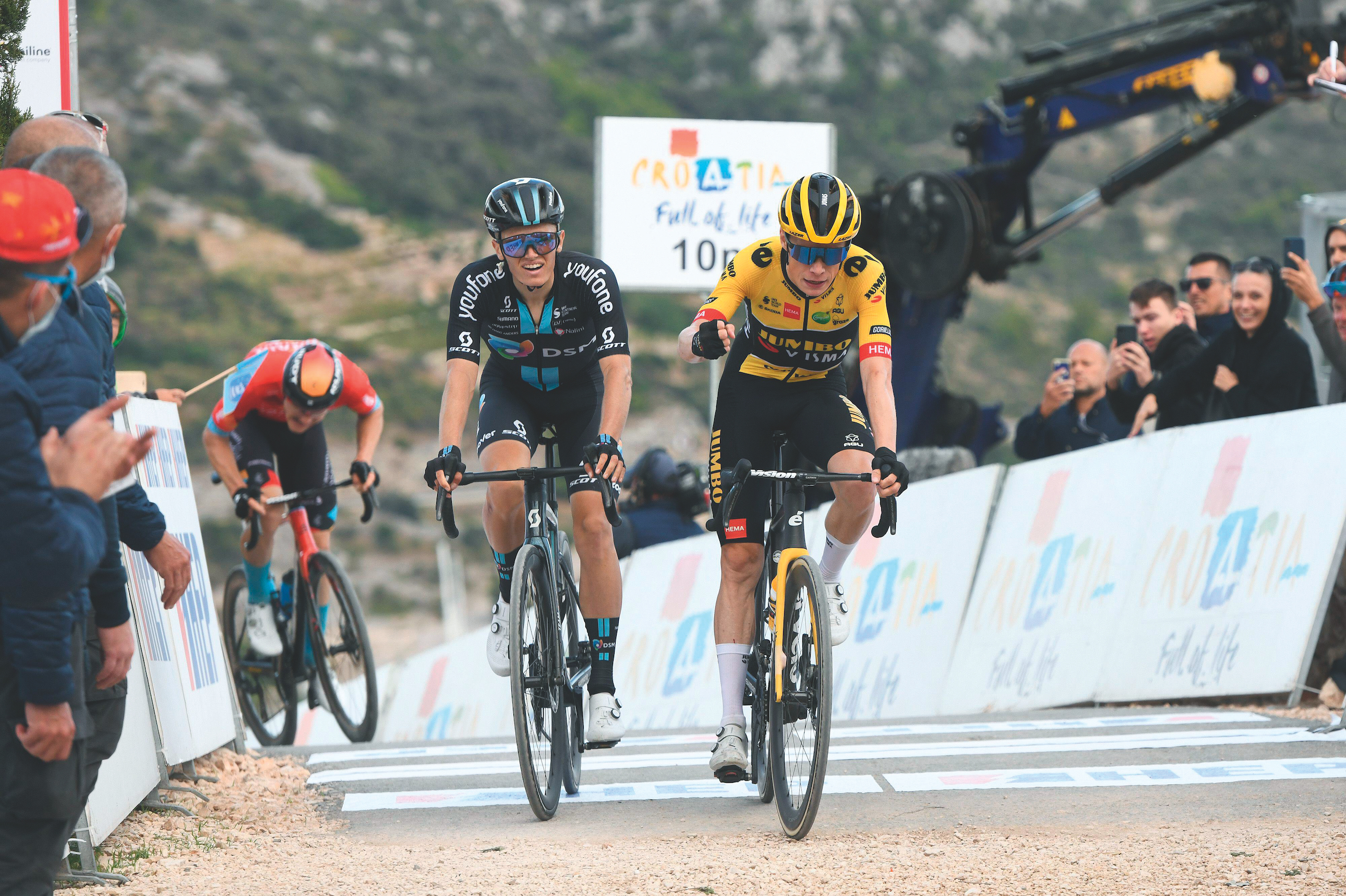Service, escapes and innocence: Oscar Onley's week of tough love on the WorldTour
Romain Bardet is predicting big things, but how did DSM's young Scot fare when he came up against the big boys in a WorldTour stage race for the first time?


Oscar Onley began last week’s Volta a Catalunya with the sort of youthful exuberance and innocence that only 20 year olds can have. “You don’t really think about it because it just happens naturally,” he said of starting his first WorldTour stage race.
By the end of the week and two breakaways later, he was a spent figure. It had been an exhausting seven days. He’d come up against his own limits, faced down numerous savage ascents, and learned a thing or two about racing with the very elite on the toughest of stages. “The level’s a bit higher than what I have been used to so far,” he analysed. “I haven’t got the best legs to hold onto the top guys yet.”
A neo-pro with DSM, after two years impressing for their development team, the Scotsman rose to prominence last October when he finished third at the CRO Tour, only Tour de France winner Jonas Vingegaard and Milan-Sanremo victor Matej Mohorič above him.
Catalunya, however, was an altogether different type of race, not least because of its position in the calendar. The big-hitters, Primož Roglič and Remco Evenepoel, were here, intent on taking chunks out of each other at every point.
Carnage was promised, and carnage was delivered.
Just being on the startline was an achievement when Onley, financially backed last year by The Rayner Foundation, allowed himself to consider the speed of his progression. “If I look at where I was this time last year, and now I am doing my first WorldTour stage race, it’s a big step. I’m happy to be here,” he smiled.
He didn’t waste any time in trying to force an impression, jumping straight into a five-man break on the opening stage, on the recommendation of team DS Matt Winston. “In the past, stage one has been a sprint, but it’s also gone to the breakaway, so we thought there was maybe a chance it could survive,” Winston said. As it happened, Onley never really thought they’d last the distance. “Not really, no!” he laughed. “We never got given much of a gap all day.” Six kilometres from the finish, they were swallowed up.
Get The Leadout Newsletter
The latest race content, interviews, features, reviews and expert buying guides, direct to your inbox!

Onley was DSM's most visible rider all week
That night, Onley’s job for the week had changed. Chris Hamilton’s withdrawal due to injury meant that Onley was now teammate Romain Bardet’s last man in the mountains. So much for Winston saying “we don’t need Oscar to do anything special this week”.
“I’ll just try to last as long as I can into the stages with him, try and support him as best as I can,” Onley said, his short and fair hair hidden by his helmet. The challenge was big: Vallter 2000 is a 15km climb, taking riders up to the highest road in the Spanish Pyrenees. The day later, there was 3,998m of elevation on the menu, culminating with a summit finish at the La Molina ski station.
Predicting how he’d fare was a mystery, guesswork. “I don’t know how I will go on these longer climbs,” he said. “I’ve never done any long climbs in pro races. I know my [power] numbers, and I know how I was going in the U23 ranks, but in the WorldTour against the top teams and top riders, it’s a different level.”
It was a prophetic statement. Not far onto the steep slopes of Vallter, Onley was dropped. Bardet, too. “I didn’t have a good day,” he rued. “Romain got dropped quite early also. It was a question of trying to stay with him a bit earlier and I could have helped him for a bit longer on the climb, but I just didn’t have great legs.”
La Molina was better. “I managed to stay with Romain on the long climb and tried to support him on the final climb,” he said.
That day he climbed aboard his team bus in a reflective mood. “If I compare myself with the guys at the Tour of Algarve [in February where he won the youth classification] and some of the races I did last year, I could hold onto them on those shorter, five to 10 minute climbs. But for the longer climbs like here, I am not quite up there yet.”
Nonetheless, the Frenchman he was working for was impressed. “I have no doubt that Oscar can be a really good, super strong rider who can win some pretty big races,” enthused Bardet, a two-time Tour de France podium finisher. “This is Oscar’s first WorldTour stage race. He is learning, but he is already in a good process to become one of the best riders in the coming years.”
What made him say that? “It’s his maturity - he is super mature for his age. He’s also super keen to learn. But above all it’s his strength on the bike. For sure he could be a super good puncheur, but also on longer climbs he might be up there in the future. He’s still so young so he needs to get experience, to discover himself, and to see if he really can be at the top.”

Onley finished second behind Jonas Vingegaard on a stage of the CRO Tour last October
Onley doesn’t strike you as a man of authority, but nor does he look cowed. Winston revealed a trait he’s detected in the youngster. “He shares his voice, shares his opinion, and when we do meetings he speaks in a really good way,” he said. “He really believes in doing something as a team, of working together. These are important values to him and he’s not afraid to bring that up in a meeting.”
DSM, as well-publicised, is a team that is a stickler for rules. It’s a regimented set-up, the finer details are analysed to the nth degree, and everything is documented. It might not work for some, but it appears ideal for someone as meticulous as Onley.
“We have a log book, and everyday I put in how I felt, what went well, what didn’t, and this week a lot of it has been what I need to improve on and work on in the coming weeks.”
Which is? “Fatigue resistance,” he answered. “These WorldTour stage races open up a bit earlier than the final climb so it’s getting used to that. The La Molina stage, we went pretty hard up the longer climb, so by the final climb I didn’t really have the legs. I wasn’t doing massive power or anything, but I couldn’t do any more. I had a limit that was lower than the rest.”
Read more: Introducing Oscar Onley, the 19-year-old who almost beat Jonas Vingegaard twice
It says everything about Onley, however, that just a day after uttering those words, he was active once again, forming part of the day’s late breakaway on the sixth stage. It too was foiled, Roglič and Evenepoel wanting all the fun for themselves, but Onley - fatigued or not - was hungry to get involved. “We are really happy with him, and we think he will keep progressing as the season goes on,” Winston said.
Come Barcelona, the end of a frantic week of racing, Onley was a very respectable 39th on GC. It had been a busy seven days: a WorldTour stage race debut; a breakaway presence not once but twice; and tasked with being the final support man for one of this generation’s finest climbers.
Despite his belief at the start of his Catalan adventure, all that is not something that just happens naturally. “It’s been a really nice experience,” he summarised. “Everyone who I have spoken to so far has said that this is one of the hardest one week stage races. There’s still work to do, but we can take confidence that I’m not too far off.”

Thank you for reading 20 articles this month* Join now for unlimited access
Enjoy your first month for just £1 / $1 / €1
*Read 5 free articles per month without a subscription

Join now for unlimited access
Try first month for just £1 / $1 / €1
A freelance sports journalist and podcaster, you'll mostly find Chris's byline attached to news scoops, profile interviews and long reads across a variety of different publications. He has been writing regularly for Cycling Weekly since 2013. In 2024 he released a seven-part podcast documentary, Ghost in the Machine, about motor doping in cycling.
Previously a ski, hiking and cycling guide in the Canadian Rockies and Spanish Pyrenees, he almost certainly holds the record for the most number of interviews conducted from snowy mountains. He lives in Valencia, Spain.
-
 FDJ-Suez, SD Worx-Protime, Lidl-Trek confirmed for Tour of Britain Women as strong list of teams announced
FDJ-Suez, SD Worx-Protime, Lidl-Trek confirmed for Tour of Britain Women as strong list of teams announced18 teams set to take part in four-day WorldTour stage race
By Tom Thewlis
-
 Cyclists could face life sentences for killing pedestrians if new law passed in England and Wales
Cyclists could face life sentences for killing pedestrians if new law passed in England and WalesReckless cycling currently carries a maximum two-year jail term
By Tom Thewlis